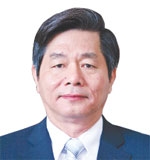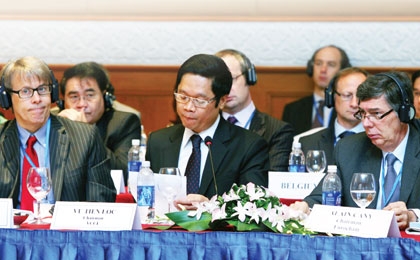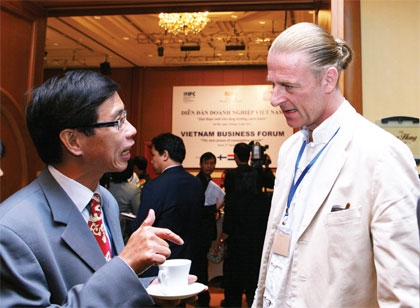Pledge to win back investors’ trust
 |
| Bui Quang Vinh Minister of Planning and Investment |
On the eve of the Vietnam Business Forum (VBF), which will take place on May 29 in Hanoi prior to the Consultative Group (CG) Meeting of Donors, Minister of Planning and Investment Bui Quang Vinh offers VIR’s Ngoc Linh a candid snapshot of the economy’s current situation and how the government will regain foreign investors’ confidence.
Since early this year, Vietnam has tamed high inflation and reduced the trade deficit. However, there are signs of economic stagnancy in the country. How can Vietnam reach its 6 per cent growth target this year?
Economic growth in 2012’s first quarter rose only 4 per cent. This is a very low level in comparison with the same period during the past two years. However, we have been successful in taming inflation, which was only 2.78 per cent in the first five months and trade deficit was $700 million. However, there are now signs of economic stagnancy. If you look at the reduction of import values, the trade deficit is under control. But if we look at the structure of Vietnam’s manufacturing sector, this is abnormal because local manufacturers cut or slowed their production and stopped importing materials and components. This resulted in a slowdown in the production industrial index which rose only 4.2 per cent in the last five months. Furthermore, state budget collections also reduced over the past months.
There are many reasons for this stagnancy, but the main reason is that the government has implemented tightened monetary and fiscal policies to tame inflation and stabilise the macroeconomy. Many enterprises could not access bank loans and lending interest rates were too high. Based on these difficulties, we forecast that the economic growth in the first half this year will be around 4.4 per cent. This means that the growth should be from 7.2-7.5 per cent in the second half to reach the target of 6 per cent for the whole year. This is very hard to achieve.

The MPI is determined to win-over investors with a range of concrete measures,
including putting the nation on the road to better infrastructure
To boost economic growth, Vietnam also aims to attract more foreign direct investment (FDI). However, while the FDI is recovering in the world, FDI commitments to Vietnam keep on declining. Why is this?
It is true that FDI commitments to Vietnam have declined during the past three years. But FDI just declined in terms of new commitments. The disbursement of capital remains at a level of around $11 billion per year for three years. And from January to May 2012, FDI disbursement slightly declined 0.02 per cent year-on-year. This indicates foreign investors are still pumping money to develop projects in Vietnam. We all know the disbursement is the most important.
In addition, foreign companies are doing very well in Vietnam. The export turnover of foreign-invested companies, excluding crude oil, from January to May rose 43.7 per cent year-on-year.
On the other hand, I can say that the decline in new commitments showed FDI attraction improvements. Several years ago, we granted investment certificates to many investors for building multi-billion-dollar projects, mostly in the property sector. However, many of them have done nothing so licences were revoked.
Thus, in general, I don’t think the decline in FDI commitments is a big issue at present. But we agreed that Vietnam has its own weaknesses in attracting new projects. These are economic uncertainties, dong devaluation, complicated administrative procedures, insufficient supporting industries and underdeveloped infrastructure system. All of those factors badly affect FDI attraction to the country. In recent years, the region has emerged as a good destination for investment. Malaysia, Indonesia, Thailand and even Myanmar are challenging Vietnam. If Vietnam doesn’t rise up at this time, we will continue lagged behind
Last September, Prime Minister Nguyen Tan Dung issued an instruction asking the MPI, in collaboration with other ministerial bodies and provinces, to take measures to improve the investment climate and FDI quality. How is the instruction proceeding?

The prime minister’s instruction is being positively implemented. According to the instruction, we found weaknesses preventing FDI from entering Vietnam. As I mentioned above, those include the economic turmoil, poor infrastructure and a poorly-skilled workforce. Furthermore, we are undertaking 20 projects to remove obstacles for foreign investors and improve the quality of FDI. In the future, FDI attraction will be appropriate to the government’s economic restructuring plan.
In which, we will give incentives to projects in some encouraged sectors and areas. The Ministry of Planning and Investment has finished a project for preventing transfer pricing and a project for developing infrastructure. Other projects are under preparation and will be finished on time.
Many investors are complaining that the current legal framework for managing FDI is not appropriate to economic development. Do you agree?
Yes, we have to create a stable and attractive legal environment for foreign investors. In the coming time, all the obstacles will be removed. The National Assembly will discuss and amend the Investment Law and Enterprise Law. The legal framework on land usage and labour will be also reviewed to make them be in line with reality. As I understand, land is a very important issue that many foreign investors are now interested in. Although many foreign-invested projects are in industrial parks, many others are invested outside industrial parks, where investors are facing site clearance issues and high compensation costs.
In your opinion, what should be done to improve foreign investors’ confidence amid current economic woes?
We have advantage of political stability, this is very important to attract FDI. However, we have many things which are discouraging foreign investors. To improve investors’ confidence, the first thing we should do now is stabilise the economy as soon as possible.
Then we need a strong commitment and real actions to improve infrastructure, workforce and legal frameworks. If we do not do that, Vietnam will lag behind regional countries like Indonesia, Malaysia and Cambodia in terms of FDI attraction.
What the stars mean:
★ Poor ★ ★ Promising ★★★ Good ★★★★ Very good ★★★★★ Exceptional
Related Contents
Latest News
More News
- MAE names big 10 policy wins in 2025 (February 06, 2026 | 08:00)
- US firms deepen energy engagement with Vietnam (February 05, 2026 | 17:23)
- Vietnam records solid FDI performance in January (February 05, 2026 | 17:11)
- Site clearance work launched for Dung Quat refinery upgrade (February 04, 2026 | 18:06)
- Masan High-Tech Materials reports profit: a view from Nui Phao mine (February 04, 2026 | 16:13)
- Hermes joins Long Thanh cargo terminal development (February 04, 2026 | 15:59)
- SCG enhances production and distribution in Vietnam (February 04, 2026 | 08:00)
- UNIVACCO strengthens Asia expansion with Vietnam facility (February 03, 2026 | 08:00)
- Cai Mep Ha Port project wins approval with $1.95bn investment (February 02, 2026 | 16:17)
- Repositioning Vietnam in Asia’s manufacturing race (February 02, 2026 | 16:00)

 Tag:
Tag:



















 Mobile Version
Mobile Version